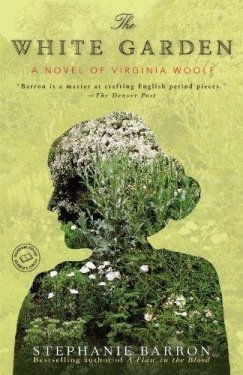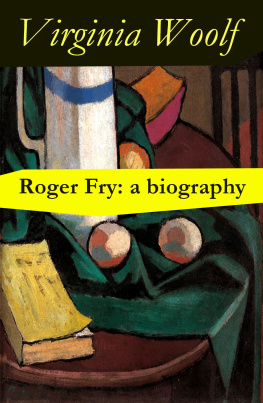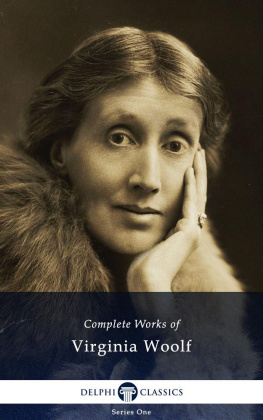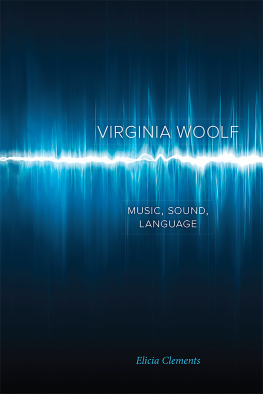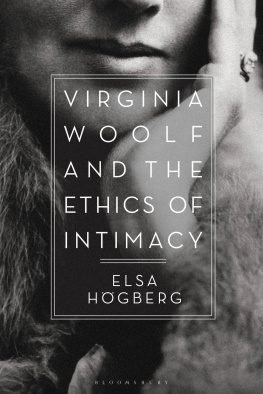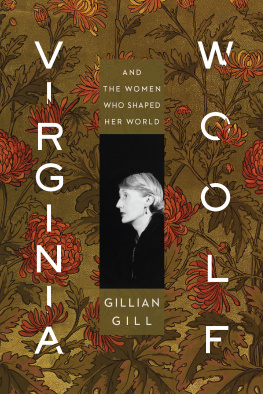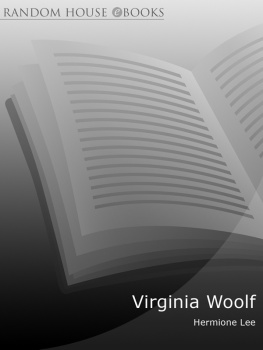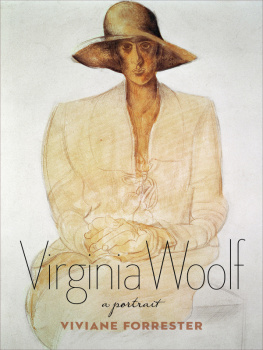Woolf Virginia - The Cambridge companion to Virginia Woolf
Here you can read online Woolf Virginia - The Cambridge companion to Virginia Woolf full text of the book (entire story) in english for free. Download pdf and epub, get meaning, cover and reviews about this ebook. City: Cambridge, year: 2006, publisher: Penguin Books Ltd;Cambridge University Press, genre: Non-fiction. Description of the work, (preface) as well as reviews are available. Best literature library LitArk.com created for fans of good reading and offers a wide selection of genres:
Romance novel
Science fiction
Adventure
Detective
Science
History
Home and family
Prose
Art
Politics
Computer
Non-fiction
Religion
Business
Children
Humor
Choose a favorite category and find really read worthwhile books. Enjoy immersion in the world of imagination, feel the emotions of the characters or learn something new for yourself, make an fascinating discovery.

- Book:The Cambridge companion to Virginia Woolf
- Author:
- Publisher:Penguin Books Ltd;Cambridge University Press
- Genre:
- Year:2006
- City:Cambridge
- Rating:3 / 5
- Favourites:Add to favourites
- Your mark:
- 60
- 1
- 2
- 3
- 4
- 5
The Cambridge companion to Virginia Woolf: summary, description and annotation
We offer to read an annotation, description, summary or preface (depends on what the author of the book "The Cambridge companion to Virginia Woolf" wrote himself). If you haven't found the necessary information about the book — write in the comments, we will try to find it.
The Cambridge companion to Virginia Woolf — read online for free the complete book (whole text) full work
Below is the text of the book, divided by pages. System saving the place of the last page read, allows you to conveniently read the book "The Cambridge companion to Virginia Woolf" online for free, without having to search again every time where you left off. Put a bookmark, and you can go to the page where you finished reading at any time.
Font size:
Interval:
Bookmark:
PENGUIN BOOKS
VIRGINIA WOOLF: AN INNER LIFE
The effect of this Life is cumulative, various respectful of her readers initiative in shaping a Woolf of our own Lyndall Gordon, Independent on Sunday
Immensely readable Briggs allows her subject the space to breathe, creating a deliciously furtive sense of peering over Virginias shoulder I found myself referring back to the novels with renewed enthusiasm and increased knowledge. What better display of the success of a literary biography? Ze Strachan, Herald
For any intelligent person wishing to get to grips with Woolfs work what it is all about, how it evolved in the writing, why it is as it is it would be a fine place to begin Victoria Glendinning, Guardian
It captures the intense pleasures of her art, the necessary focus of intellectual energy and commitment to the sheer daily grind. It should be pressed into the hands of every aspiring young novelist as an exemplar of the writing life Jane Dunn, Sunday Times
Rich engaging introduces quiet surprises and insights Jim Stewart, The Times Literary Supplement
Briggs, at times writing in prose as beautiful as Woolfs, has created an original, uplifting work an excellent book Scholarly but never arrogant, poignant but unsentimental, it goes a long way towards restoring Woolfs rightful reputation as a major novelist above all else Vanessa Curtis, Scotland on Sunday
ABOUT THE AUTHOR
Julia Briggs was the general editor of the highly successful Penguin Virginia Woolf series, for which she herself edited Night and Day. She is the author of Night Visitors: The Rise and Fall of the English Ghost Story, A Woman of Passion: The Life of E. Nesbit, 18581924 and This Stage-play World: Texts and Contexts, 15801625. She is currently Professor of English and Womens Studies at De Montford University. Julia Briggs was made an OBE in 2006.
JULIA BRIGGS
An Inner Life

PENGUIN BOOKS
PENGUIN BOOKS
Published by the Penguin Group
Penguin Books Ltd, 80 Strand, London WC2R 0RL, England
Penguin Group (USA) Inc., 375 Hudson Street, New York, New York 10014, USA
Penguin Group (Canada), 90 Eglinton Avenue East, Suite 700, Toronto, Ontario, Canada M4P 2Y3
(a division of Pearson Penguin Canada Inc.)
Penguin Ireland, 25 St Stephens Green, Dublin 2, Ireland
(a division of Penguin Books Ltd)
Penguin Group (Australia), 250 Camberwell Road, Camberwell, Victoria 3124, Australia
(a division of Pearson Australia Group Pty Ltd)
Penguin Books India Pvt Ltd, 11 Community Centre, Panchsheel Park, New Delhi 110 017, India
Penguin Group (NZ), cnr Airborne and Rosedale Roads, Albany, Auckland 1310, New Zealand
(a division of Pearson New Zealand Ltd)
Penguin Books (South Africa) (Pty) Ltd, 24 Sturdee Avenue, Rosebank, Johannesburg 2196, South Africa
Penguin Books Ltd, Registered Offices: 80 Strand, London WC2R 0RL, England
www.penguin.com
First published by Allen Lane 2005
Published in Penguin Books 2006
1
Copyright Julia Briggs, 2005
All rights reserved
The moral right of the author has been asserted
Except in the United States of America, this book is sold subject
to the condition that it shall not, by way of trade or otherwise, be lent,
re-sold, hired out, or otherwise circulated without the publishers
prior consent in any form of binding or cover other than that in
which it is published and without a similar condition including this
condition being imposed on the subsequent purchaser
EISBN: 9780141905495
For Anthea
[E]very secret of a writers soul, every experience of his life, every quality of his mind is written large in his works, yet we require critics to explain the one and biographers to expound the other.
In Virginia Woolfs Orlando, the narrator/biographer is driven to frenzies of impatience when her subject abandons herself to this mere wool-gathering; this thinking; this sitting in a chair day in, day out, with a cigarette and a sheet of paper and a pen and an inkpot. If only subjects, we might complain (for our patience is wearing thin), had more consideration for their biographers! Though silent, and apparently doing practically nothing, the writer is paradoxically doing exactly what makes her life matter to us, even though her activity, her surrender to thought and imagination, may be invisible to an observer.
Woolfs fiction is centrally concerned with the inner life, and finding ways of re-creating that life in narrative. Her first two novels, though more traditional than her later fiction, are preoccupied with dreams both night dreams and day dreams; she even considered calling the novel that became Night and Day, Dreams and Realities. can have the same impact as actual events. From this point on, Woolfs fiction weaves its way in and out of the minds of her characters. Her last novel, Between the Acts, creates a series of collisions between mind-acts and actual events.
In his magisterial survey of representation in European fiction, Mimesis, the German critic Erich Auerbach argued that Woolfs method of depicting the interior life of a range of characters gestured towards a common life of mankind on earth, and he considered this a new and significant development in narrative method. Both writers share a tradition of womens writing in which moral awareness carries the reader across the boundaries of gender, class and race in the interests of wider sympathy and understanding. In re-creating the interiority of others, Woolf drew, as she had to, on what she knew of her own. She remained a fascinated observer of her own thoughts and also of her own creative process, recording both in her diaries and letters; her late, unfinished autobiographical Sketch of the Past takes a closer look within.
My account is inspired by Woolfs own interest in the process of writing, as well as by a corresponding unease with accounts that (like Orlandos biographer) concentrate too narrowly on her social life, and so underestimate the centrality of her art the main source of her interest for us. Woolf was evidently a highly sociable person, with a fascinating and gifted circle of family and friends, an engaging companion and an entrancing aunt, yet it was what she did when she was alone, walking or sitting at her desk, for which we now remember her. While the story of her inner life cannot be told (except as another fiction), it is possible to track down a number of the factors that brought her books into being, by following the genesis and process of their writing as reflected in the surviving drafts, and supplementing these with the accounts she gave to friends, or confided to her diary as aids to reconstruction. My aim, ultimately, is to lead readers back to her work with a fresh sense of what they might find there. Although the book has an overall direction, individual chapters are structured in different ways, as seemed most appropriate, though each concludes with an aftermath, a history of the books production and reception after publication. These can, of course, be skipped, as can the endnotes, which list sources and suggest lines of thought that seemed too specialized or speculative to appeal to the common reader, for whom my book is primarily intended.
This book inevitably stands upon the achievements of other Woolf scholars, editors, critics and readers most of these are, I hope, acknowledged in the endnotes. It has taken me several years to write, and I have incurred many debts along the way: the first is to the Arts and Humanities Research Board who, in conjunction with my university, De Montfort, Leicester, enabled me to take a years research leave from January 1999 to January 2000. I am warmly grateful to the colleagues who made this possible to Deborah Cartmell, Jane Dowson, Imelda Whelehan and Nigel Wood. I have learned a great deal about Woolf in conversation with friends and colleagues, both here and abroad, and fear that, in the process, I have both borrowed and distorted their ideas without necessarily noticing that I was doing so. I particularly want to thank Michle Barrett, James Beechey, Kate Benzel, Ted Bishop, Rachel Bowlby, David Bradshaw, Beth Rigel Daugherty, Marion Dell, Diane Gillespie, Kathy Laing, Phyllis Lassner, Jane Liddell-King, Alison Light, Nicola Luckhurst, Vara Neverow, Sybil Oldfield, Merry Pawlowski, Jem Poster, Sue Roe, Anna Snaith, Alice Staveley and Pierre-Eric Villeneuve. I am well aware of how much the kindness of librarians has contributed, and particularly want to thank the incomparable Bet Inglis, formerly of Sussex University Library, who always knew what one needed before one knew oneself; and also Michael Bott of Reading University Library, Dr Isaac Gewirtz, Curator of the Berg Collection in the New York Public Library, and Karen Kukil, Curator of the Rare Book Room at Smith College, Northampton, Mass.
Next pageFont size:
Interval:
Bookmark:
Similar books «The Cambridge companion to Virginia Woolf»
Look at similar books to The Cambridge companion to Virginia Woolf. We have selected literature similar in name and meaning in the hope of providing readers with more options to find new, interesting, not yet read works.
Discussion, reviews of the book The Cambridge companion to Virginia Woolf and just readers' own opinions. Leave your comments, write what you think about the work, its meaning or the main characters. Specify what exactly you liked and what you didn't like, and why you think so.

